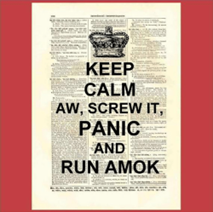Are your kids mindlessly running around the house? You could say they will "run amok" until you tell them to stop. This post unpacks the meaning and origin of this expression.
Meaning
The expression "run amok" means to behave in a disorderly or wild manner. If someone is "running amok," they display crazy, outlandish behavior that may or may not be harmful to other people and property around them. Some people may spell "amok" as "amuck." Both "amok" and "Amuck" have the same meaning. You can use both interchangeably, but “amok” is the more common version.
Example Usage
"The football team lost the game, and the fans decided to run amok in the stadium. They rushed the field and almost caused a mass stampede that could have injured many people."
"That's what you get when you let people run amok. People will take advantage of the situation if there's no law and order and start looting and rioting."
"The passengers decided to run amok through the airport after being told their flight was canceled, and they would have to wait three days for a new flight to their destination."
"The team ran amok after being told they were not getting a raise. The management had to lock themselves in the office to avoid being lynched by the mob."
"The woke mob on Twitter ran amok after finding out Elon Musk was buying the company. They started banning people left and right."
"The situation has run amok after a little girl was involved in a police shooting earlier this morning. People are rioting in the streets and demanding resolution."
"You can run amok all you like, but it's not going to do you any good. There's no point to it, and it will only cost you your freedom."


Origin
The expression "run amok" originates from Southeast Asia. The local languages of the area spell the word "amok" as "amuk," "amuck," or "amuco," with the meaning a murderous rage or frenzy. The word originates from the mental state of the "Amuco," a warrior class used to control societal struggles in Malaysia and Java.
The locals believed fallen warriors became the favorite of the gods, and failed warriors would not attain paradise. Amuco warrior attacks were frenzied and maniacal, with the first accounts of this behavior appearing in the 1516 text "Barbosa," translated in 1866 by Stanley, which reads as follows.
"There are some of them [the Javanese] who go out into the streets and kill as many persons as they meet. These are called Amuco."
Captain James Cook wrote "Voyages" in 1772, defining "run amok" as the following.
"To run amock is to get drunk with opium... to sally forth from the house, kill the person or persons supposed to have injured the Amock, and any other person that attempts to impede his passage."
Phrases Similar to Run Amok
- Run amuck.
- Run amock.
Phrases Opposite to Run Amok
- Calm and peaceful.
What is the Correct Saying?
- Run amok.
- Ran amok.
Ways People May Say Run Amok Incorrectly
The phrase "run amok" is often misspelled as "amock" or "Amuck." While these spellings are not necessarily incorrect, the modern version of the word is "amok."
Acceptable Ways to Phrase Run Amok
You can use the expression "run amok" to describe situations where people's behavior and actions are wild and out of control. It describes scenarios where you can't contain a mob or if a single person is acting wild and erratic and can't be stopped. If someone is running amok, they're creating a scene, and they may or may not present a danger to others.
The saying suits social and professional settings. For instance, the store employees ran amok after the boss announced they had to work the weekend. They organized a strike with the union and started picketing outside the store. Or you could say a crowd ran amok after their football team won the game.